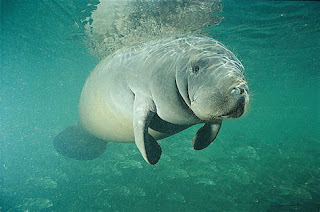Mermaids and Manatees
*0 Also known as the Sea Cow, Manatees have multiple nicknames from multiple cultures, none of which include Mermaid. Wait, hold on- *1
The Manatee : Trichechus
We all know that Christopher Columbus is known for putting North America on the map. (The American education system hasn't failed us yet, right?? *2) However, this incredible accomplishment overshadows something perhaps even more astounding. On January 9, 1943, Columbus sighted and recorded his observation of three mermaids swimming in the Atlantic Ocean.
Plot twist: these "mermaids" were actually the first recorded observations of Manatees. Back then, these creatures were practically unheard of. Today, the awe and mystique of a Manatee sighting has faded into what are actually quite common sightings on the Atlantic coasts. Over 6000 Manatees live near Florida's coastline; these are categorized as West Indian (or American) Manatees. There are three species in total which are categorized by distribution around the world. The other two species include the Western African Manatee and Amazonian Manatee. All three species of Manatee are mainly distributed around coastal regions of the Atlantic Ocean such as Florida, the Caribbean Sea, the Amazon Basin, and Western Africa.
Because they live so close to civilization, Manatees are often faced with threats such as boat collisions, water pollution, hunting, and fishing accidents. Originally classified as Endangered, the US recently declared Manatees as Threatened. There are around 10,000 to 13,000 surviving in the wild; this population is closely related to the availability of sea grass and vegetation available. For example, around two years ago, a large number of Manatees starved due to an unusual seagrass die-off in Florida. A feeding program distributing over 3000 pounds of lettuce per day*3 saved the remaining Manatees.
Manatees are herbivores and sustain themselves primarily on sea grasses, algae, and other submerged, floating, and shoreline vegetation. They can consume anywhere from 4-9% of their body weight in one day. However, some Manatees (such as Amazonian Manatees) that live in deep waters are known to fast during the dry season of November and December when there's limited access to vegetation due to dropping water levels. Research has even suggested that Manatees may fast up to 11 months if necessary.
From feeding off the bottom of aquatic ecosystems to hoisting themselves onto the shore for bank vegetation, Manatees will wander onto almost any area. They're able to eat a variety of sea grasses because of their pointed, ridged palate and lower jaw that's able to break down vegetation into small edible pieces. Manatees rely on freshwater for their survival, but they're also able to live in almost all types of fresh water, brackish, and saltwater ecosystems. Those that do live in saltwater areas often need to find a human-made freshwater source on land. However, it's unavoidable for Manatees to drink small amounts of saltwater when they feed on vegetation growing in saltwater ecosystems.
Although they may not be the magical mermaids myth likens them to be, Manatees are fascinating in their own right, a curious member of the Animalia kingdom that we know little about. However, similar to what I think a mermaid is like, Manatees are ancient and mysterious, almost languid and free flowing, so unlike other marine creatures whose personalities range from bubbly dolphins to vicious sharks. For now, these Manatees, once mistaken as mermaids, are writing their own legends in the waters of the Atlantic.
*0-i'm trying a new way to discreetly insert unfitting comments into information hence...
footnotes
*1 - manatees belong to the Sirenia order; Sirenia->Sirens->...
*2 - following the aftermath of the chaos of college applications, one should note that a four-year college education may take 40 years to pay off. BTW did I mention that the newly created digital SAT is so easy the curve is beyond reasonable and that schools are now downgrading requirements and curriculums on subjects like chemistry and physics?
*3- does anyone else wonder how one city got so much lettuce? and why lettuce? was there a surplus of lettuce? when has there ever been a surplus of any food in a world where 10% of the human population is starving because of a lack of surplus?
https://seaworld.org/animals/
https://www.savethemanatee.
https://www.orlandofamilymagazine.com/family-fun/out-and-about/manatee-in-the-wild-an-unforgettable-family-experience/
https://www.grunge.com/183517/did-columbus-really-see-mermaids/#:~:text=Christopher%20Columbus%27%20%27mermaids%27%20were%20actually%20manatees%20Shutterstock%20Yeah%2C,%22not%20half%20as%20beautiful%20as%20they%20were%20painted.%22




Comments
Post a Comment